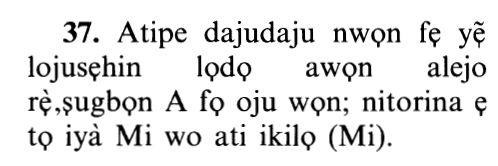54vs37
Select any filter and click on Go! to see results
وَلَقَدْ رَاوَدُوهُ عَن ضَيْفِهِ فَطَمَسْنَا أَعْيُنَهُمْ فَذُوقُوا عَذَابِي وَنُذُرِ
Walaqad rawadoohu AAan dayfihi fatamasna aAAyunahum fathooqoo AAathabee wanuthuri
Index Terms
Click to play
Yoruba Translation

Hausa Translation
Kuma lalle haƙĩƙa, su, sun nħme shi ta wajen bãƙinsa, sai Muka shãfe idãnunsu. "To, ku ɗanɗani azãbaTa da gargaɗĩNa."
Asbabu n-Nuzuul (Occasions of Revelation)
وَلَقَدْ رَاوَدُوهُ عَن ضَيْفِهِ ...
And they indeed sought to shame his guests,
that is the night the angels Jibril, Mika'il and Israfil came to him in the shape of handsome young men, as a test from Allah for Lut's people. Lut hosted his guests, while his wife, the evil old one, sent a message to her people informing them of Lut's guests. They came to him in haste from every direction, and Lut had to close the door in their faces. They came during the night and tried to break the door; Lut tried to fend them off, while shielding his guests from them, saying,
هَـؤُلآءِ بَنَاتِى إِن كُنْتُمْ فَـعِلِينَ
These are my daughters, if you must act (so). (15:71),
in reference to their women,
قَالُواْ لَقَدْ عَلِمْتَ مَا لَنَا فِى بَنَاتِكَ مِنْ حَقٍّ
They said: "Surely, you know that we have neither any desire nor need of your daughters!'' (11:79),
meaning, `we do not have any desire for women,'
وَإِنَّكَ لَتَعْلَمُ مَا نُرِيدُ
and indeed you know well what we want! (11:79)
... فَطَمَسْنَا أَعْيُنَهُمْ فَذُوقُوا عَذَابِي وَنُذُرِ ﴿٣٧﴾
So, We blinded their eyes (saying), "Then taste you My torment and My warnings.''
When the situation became serious and they insisted on coming in, Jibril went out to them and struck their eyes with the tip of his wing, causing them to lose their sight. They went back feeling for the walls to guide them, threatening Lut with what would befall him in the morning.
ذلك ليلة ورد عليه الملائكة جبريل وميكائيل وإسرافيل في صور شباب مرد حسان محنة من الله بهم فأضافهم لوط " وبعثت امرأته العجوز السوء إلى قومها فأعلمتهم بأضياف لوط فأقبلوا يهرعون إليه من كل مكان فأغلق لوط دونهم الباب فجعلوا يحاولون كسر الباب وذلك عشية ولوط عليه السلام يدافعهم ويمانعهم دون أضيافه ويقول لهم" هؤلاء بناتي " يعني نساءهم " إن كنتم فاعلين قالوا لقد علمت ما لنا في بناتك من حق " أي ليس لنا فيهن أرب " وإنك لتعلم ما نريد " فلما اشتد الحال وأبوا إلا الدخول خرج عليهم جبريل عليه السلام فضرب أعينهم بطرف جناحه فانطمست أعينهم يقال إنها غارت من وجوههم وقيل إنه لم تبق لهم عيون بالكلية .
"ولقد راودوه عن ضيفه" أن يخلي بينهم وبين القوم الذين أتوه في صورة الأضياف ليخبثوا بهم وكانوا ملائكة "فطمسنا أعينهم" أعميناها وجعلناها بلا شق كباقي الوجه بأن صفقها جبريل بجناحه "فذوقوا" فقلنا لهم ذوقوا "عذابي ونذر" إنذاري وتخويفي أي ثمرته وفائدته
أي أرادوا منه تمكينهم ممن كان أتاه من الملائكة في هيئة الأضياف طلبا للفاحشة على ما تقدم . يقال : راودته على كذا مراودة وروادا أي أردته . وراد الكلأ يروده رودا وريادا , وارتاده ارتيادا بمعنى أي طلبه ; وفي الحديث : ( إذا بال أحدكم فليرتد لبوله ) أي يطلب مكانا لينا أو منحدرا .
I'raab - grammatical analysis of the Qur'an
«وَلَقَدْ» سبق إعرابها ، «راوَدُوهُ» ماض وفاعله ومفعوله والجملة جواب القسم لا محل لها ، «عَنْ ضَيْفِهِ» متعلقان بالفعل ، «فَطَمَسْنا أَعْيُنَهُمْ» ماض وفاعله ومفعوله والجملة معطوفة على ما قبلها ، «فَذُوقُوا» حرف عطف وأمر مبني على حذف النون والواو فاعله «عَذابِي» مفعوله «وَنُذُرِ» معطوف على عذابي والجملة مقول قول محذوف.
